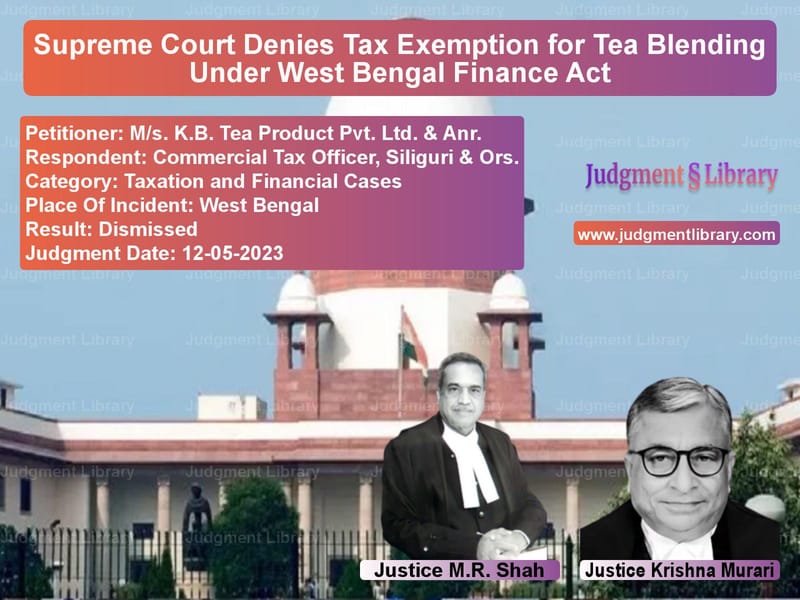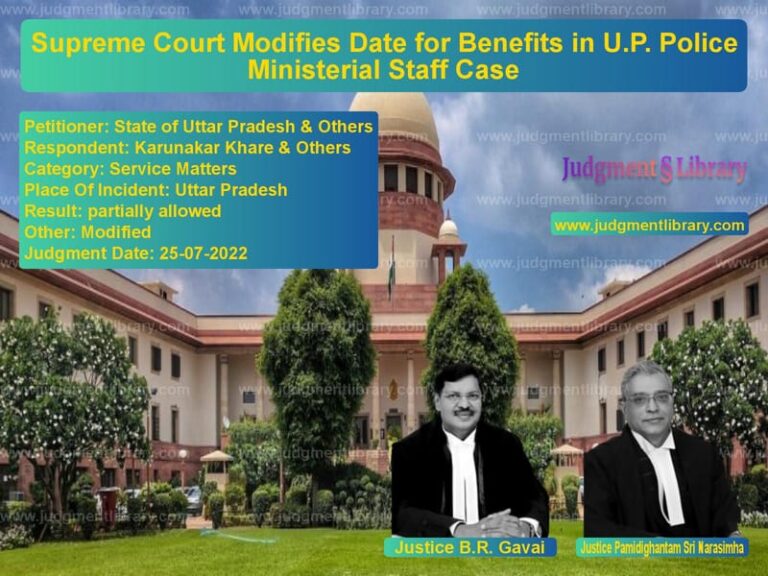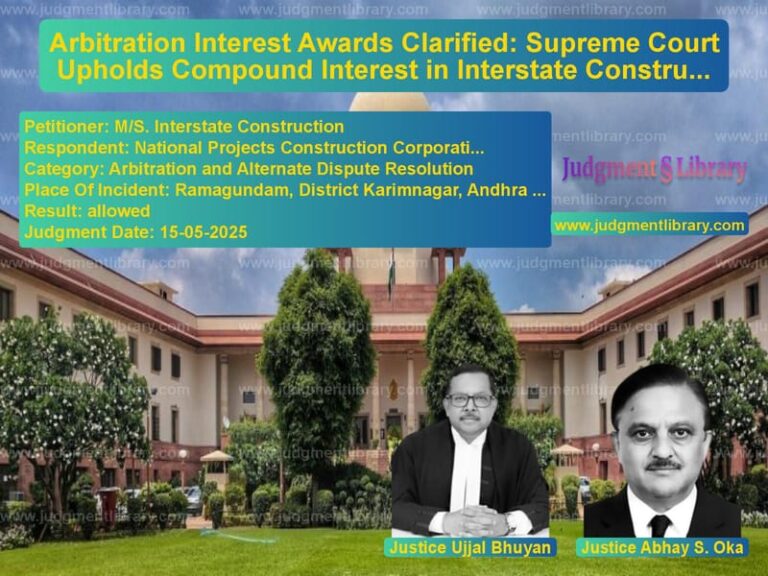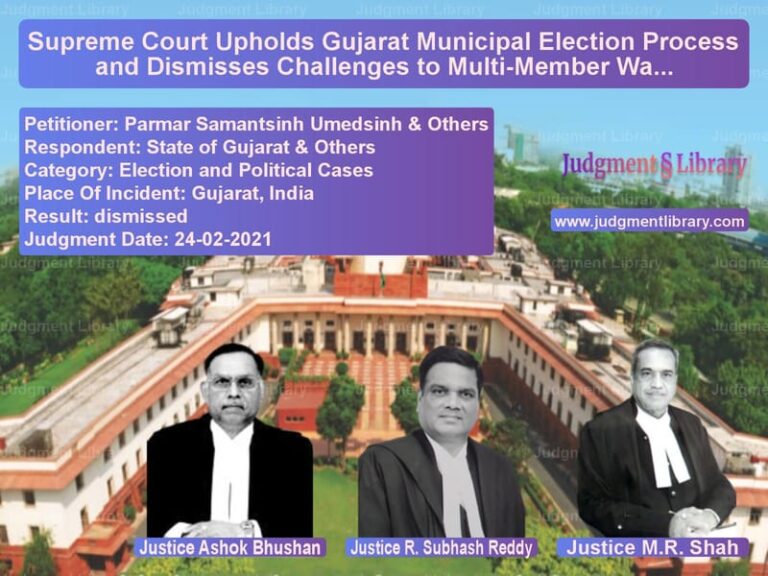Supreme Court Denies Tax Exemption for Tea Blending Under West Bengal Finance Act
The case of M/s. K.B. Tea Product Pvt. Ltd. & Anr. v. Commercial Tax Officer, Siliguri & Ors. revolves around the withdrawal of tax exemption for tea blending under the West Bengal Finance Act, 2001. The Supreme Court was called upon to decide whether the amendment to Section 2(17) of the West Bengal Sales Tax Act, 1994, which excluded ‘blending of tea’ from the definition of ‘manufacture,’ could retrospectively deny tax benefits previously granted to small-scale industrial units.
This judgment is significant as it clarifies the application of tax exemptions and the principle of legitimate expectation in cases where government policies change after businesses have made investments based on earlier incentives.
Background of the Case
The appellants, M/s. K.B. Tea Product Pvt. Ltd., were engaged in the business of tea blending in West Bengal. They set up a small-scale industrial unit based on the incentives provided by the West Bengal Incentive Scheme, 1999, which granted tax exemptions for manufacturing units.
Read also: https://judgmentlibrary.com/supreme-court-orders-fresh-decision-in-income-tax-settlement-case/
The key facts of the case are:
- Under the Bengal Finance (Sales Tax) Act, 1941, ‘blending of tea’ was included in the definition of ‘manufacture.’
- The West Bengal Sales Tax Act, 1994, which replaced the 1941 Act, continued to include ‘blending of tea’ under ‘manufacture.’
- As a result, tea blending businesses were eligible for tax exemptions under the 1999 Incentive Scheme.
- On August 1, 2001, the West Bengal Finance Act, 2001 amended Section 2(17) of the 1994 Act, removing ‘blending of tea’ from the definition of ‘manufacture.’
- Following this amendment, the appellants were denied tax exemption, prompting them to challenge the decision before the Tribunal and subsequently before the High Court of Calcutta.
The High Court ruled against the appellants, leading to the present appeal before the Supreme Court.
Petitioner’s Arguments
The appellants, represented by Ms. Kavita Jha, argued:
- They had made substantial investments in setting up their tea blending business, relying on the tax exemptions promised under the 1999 Incentive Scheme.
- The amendment unfairly removed their eligibility for exemption without considering the financial commitments they had already made.
- The withdrawal of tax benefits violated the doctrine of legitimate expectation, as they had a reasonable expectation that the incentives would continue for the entire period stated in the scheme.
- The government had not demonstrated any ‘overarching public interest’ justifying the amendment that revoked their tax exemption.
- Other businesses that had invested under the same scheme would also suffer financial setbacks due to the abrupt policy change.
Respondent’s Arguments
The respondents, represented by Ms. Madhumita Bhattacharjee, countered:
- The government had the legislative authority to modify tax policies and withdraw exemptions.
- The amendment was prospective, meaning that exemptions were withdrawn only from the date of the amendment, not retroactively.
- The exemption was always conditional on compliance with the definition of ‘manufacture’ under Section 2(17) of the 1994 Act.
- Since ‘tea blending’ was removed from the definition, the appellants no longer qualified as ‘manufacturers’ and could not claim tax exemptions meant for manufacturing units.
- There was no ‘vested right’ in tax exemptions, as taxation policies are subject to change at the discretion of the state.
Supreme Court Judgment
The case was heard by Justice M.R. Shah and Justice Krishna Murari. The Court ruled against the appellants, holding that they were not entitled to continued tax exemptions after ‘blending of tea’ was removed from the definition of ‘manufacture.’
1. No Vested Right in Tax Exemptions
The Court ruled that tax exemptions are policy decisions and can be withdrawn at the discretion of the government:
‘Nobody can claim the exemption as a matter of right. The exemption is always on the fulfillment of the conditions for availing the exemption, and the same can be withdrawn by the State.’
2. Amendment Was Prospective
The Court clarified that the amendment to Section 2(17) was prospective:
‘On and from 01.08.2001, the moment ‘tea blending’ ceased to be a manufacturing activity, the appellants ceased to be manufacturers and were no longer entitled to exemption from sales tax.’
3. No Legitimate Expectation Against a Statute
The Court rejected the argument that the appellants had a legitimate expectation to continue receiving tax exemptions:
‘There cannot be any legitimate expectation against a statute. If the legislature in its wisdom excludes ‘tea blending’ from the definition of manufacture, businesses engaged in such activities cannot claim benefits meant for manufacturers.’
4. Policy Decisions Not Subject to Judicial Review
The Court held that the judiciary cannot interfere in policy decisions unless they are arbitrary or unconstitutional:
‘To grant or withdraw exemptions is always within the domain of the State Government and falls within the ambit of policy decisions. Unless withdrawal is found to be so arbitrary, the Court would be reluctant to interfere.’
Final Verdict
The Supreme Court ruled:
- The appeal was dismissed.
- The withdrawal of tax exemption was valid and enforceable.
- The appellants were required to pay sales tax from August 1, 2001, onwards.
- The principle of legitimate expectation does not apply to statutory amendments.
Conclusion
This judgment reinforces the principle that tax exemptions are policy matters and that businesses cannot claim indefinite benefits based on past policies. The ruling upholds the power of state legislatures to modify tax laws and ensures that tax policies remain adaptable to economic and administrative needs.
Petitioner Name: M/s. K.B. Tea Product Pvt. Ltd. & Anr..Respondent Name: Commercial Tax Officer, Siliguri & Ors..Judgment By: Justice M.R. Shah, Justice Krishna Murari.Place Of Incident: West Bengal.Judgment Date: 12-05-2023.
Don’t miss out on the full details! Download the complete judgment in PDF format below and gain valuable insights instantly!
Download Judgment: ms.-k.b.-tea-produc-vs-commercial-tax-offic-supreme-court-of-india-judgment-dated-12-05-2023.pdf
Directly Download Judgment: Directly download this Judgment
See all petitions in Tax Refund Disputes
See all petitions in Income Tax Disputes
See all petitions in Banking Regulations
See all petitions in Judgment by Mukeshkumar Rasikbhai Shah
See all petitions in Judgment by Krishna Murari
See all petitions in dismissed
See all petitions in supreme court of India judgments May 2023
See all petitions in 2023 judgments
See all posts in Taxation and Financial Cases Category
See all allowed petitions in Taxation and Financial Cases Category
See all Dismissed petitions in Taxation and Financial Cases Category
See all partially allowed petitions in Taxation and Financial Cases Category







